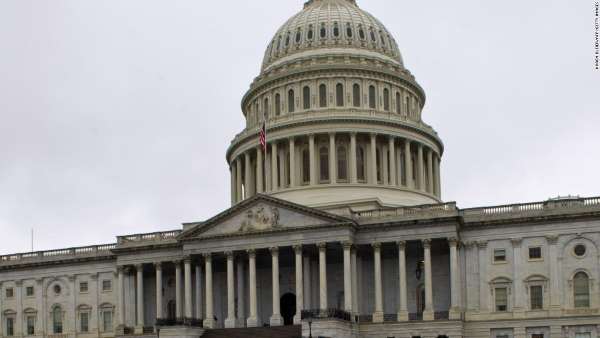Throughout the spring, summer and fall, vulnerable Senate Republicans and their allies ran TV ads touting their efforts to pass multi-trillion dollar bills addressing the coronavirus pandemic. I
In Georgia, a Republican super PAC praised "quick action" from Sen. David Perdue to direct funding to hospitals, while North Carolina Sen. Thom Tillis ran ads about setting up the Paycheck Protection Program to save small businesses.
But Senate Republicans have largely dropped mentioning coronavirus in TV ads during the final weeks of the election, while Senate Democrats have continued to emphasize the pandemic and health care throughout their campaigns, according to a CNN analysis of Kantar Media/CMAG advertising data.
The review covers the top 10 competitive Senate races in nine states: Arizona, Colorado, Georgia, Iowa, Maine, Michigan, Montana, North Carolina and South Carolina (Georgia has two Senate races this year).
Republicans referred to coronavirus in roughly 41% of their TV ads in these Senate races through the end of September, but only in 6% of their ads since October 1. At least 10 other issues were more frequently mentioned in their ads over the past few weeks.
By contrast, coronavirus has been a top-three issue for Democrats and their allies, referenced in over 43% of spots through the end of September, and about 25% in the final weeks of the race.
The top issue for both parties is still health care. In general election advertising through the end of September, Senate Democrats and their allies referenced health care in over 67% of TV advertisement spots, and they have continued to do so in nearly 58% of spots since October 1.
It was referenced to a lesser extent by Republicans, popping up in about 47% of their ads through September and about 40% of their ads since October.
"Senate Republicans have made it their mission for the past six years to tear down the Affordable Care Act and gut protections for millions of Americans with pre-existing conditions, and now voters have an opportunity to hold them accountable for their toxic records," said Democratic Senatorial Campaign Committee spokesman Stewart Boss.
"These vulnerable incumbents have repeatedly backed dangerous attacks on quality, affordable health care that are now an indefensible liability during a pandemic, and we've ensured this issue is front and centre heading into November."
Senate Republicans and their allies haven't coalesced around a single message, and when they discuss the top issue of health care, they are frequently playing defense. An ad from Montana Sen. Steve Daines warns voters that his opponent, Democratic Gov. Steve Bullock, is "using my vote to fix the Obamacare mess to lie to you about preexisting conditions."
But Republicans have attacked Democratic candidates on issues specific to their races, such as Cal Cunningham's sex scandal in North Carolina.
"Democrats have been hounded by personal scandals that are disqualifying with voters and erode their credibility," said National Republican Senatorial Committee spokesman Jesse Hunt.
In addition to their focus on health care and coronavirus, Senate Democratic candidates and their allies appear to be drafting on Democratic presidential candidate Joe Biden's campaign gains with senior voters.
Ad themes catalogued by CMAG such as Social Security and "AARP: 50+ voters" entered the top 10 for Democrats in these key Senate races in the month of October.
Senate GOP advertisers have instead looked to capitalize on fears about violent protests and defunding the police. Throughout the 2020 election cycle, themes like "public safety" and "government spending" have been top 10 issues for Republicans.
Campaigns and outside groups on both sides have devoted significant resources to criticizing the record-breaking amount of spending and the influence of other outside groups.
Campaign finance reform is a top 10 issue for Democrats and Republicans since October 1, referenced in over 14% of each party's TV ad spots.
Overall, liberal groups have spent over $848 million in Senate races, compared to over $706 million for conservative groups, according to CMAG.
Iowa Republican Sen. Joni Ernst has attacked candidate Theresa Greenfield for saying she would not take "one dime" from corporate PACs.
While she has not, the Democrat has taken hundreds of thousands of dollars from other groups that do receive corporate donations, according to multiple reports, and money from corporate officials and lobbyists.
Meanwhile the Senate Majority PAC, a Democratic super PAC, has spent over $2 million airing an ad attacking Ernst for "selling out" Iowans to special interest groups.
Latest Stories
-
Bawumia joins thousands in Kumasi for burial prayers for Ashanti Regional Imam
1 hour -
Blue Gold Bogoso Prestea Limited challenges government actions in court
2 hours -
Patrick Atangana Fouda: ‘A hero of the fight against HIV leaves us’
3 hours -
Trinity Oil MD Gabriel Kumi elected Board Chairman of Chamber of Oil Marketing Companies
3 hours -
ORAL campaign key to NDC’s election victory – North America Dema Naa
3 hours -
US Supreme Court to hear TikTok challenge to potential ban
4 hours -
Amazon faces US strike threat ahead of Christmas
4 hours -
Jaguar Land Rover electric car whistleblower sacked
4 hours -
US makes third interest rate cut despite inflation risk
4 hours -
Fish processors call for intervention against illegal trawling activities
5 hours -
Ghana will take time to recover – Akorfa Edjeani
5 hours -
Boakye Agyarko urges reforms to revitalise NPP after election defeat
5 hours -
Finance Minister skips mini-budget presentation for third time
5 hours -
‘ORAL’ team to work gratis – Ablakwa
6 hours -
Affirmative Action Coalition condemns lack of gender quotas in Transition, anti-corruption teams
6 hours

